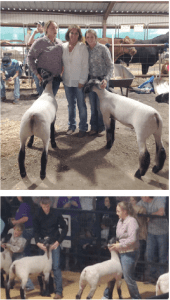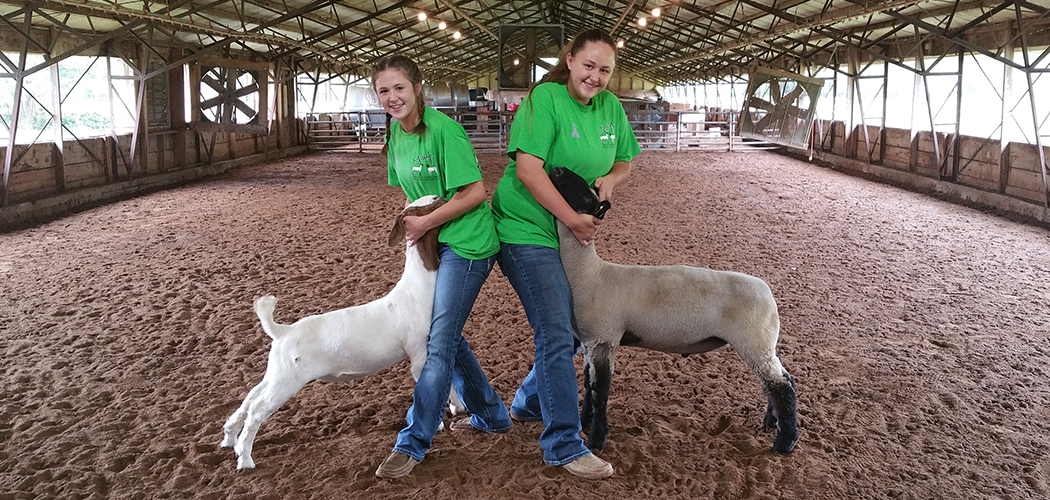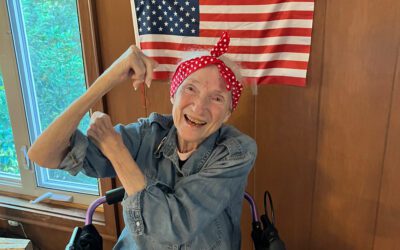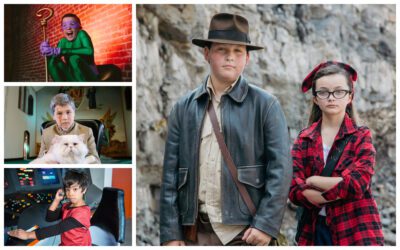[title subtitle="words: Marla Cantrell images:courtesy the Beasleys"][/title]
4-H began more than 100 years ago, and is the nation’s largest youth development organization, which is overseen by the Cooperative Extension System. Their goal is to help young people and their families learn skills that help them contribute to their communities and develop ideas for a more innovative economy. 4-H programming can be found in all fifty states, in rural, urban and suburban areas.
This Saturday starts with rain, and even when the showers end, the sky stays the color of a gray fox. At two in the afternoon, the temperature is hovering around eighty-four degrees, cool for August, and a relief for Madelyn and Annie Beasley, who are working inside the family’s barn in Mountainburg, Arkansas.
Already, they’ve mixed the feed for their lambs, using an old cement mixer their dad, Kirk, found through his job as an auctioneer.
Right now, Madelyn, who’s seventeen, and Annie, who’s fourteen, are getting ready to show their lambs at the Crawford County Fair in Mulberry, which will be held September eleventh through the sixteenth. The sisters are members of the Rocky Top 4-H Club in the Turner Community, and this year Annie is serving as the chapter’s president. Earlier in the year, the sisters applied for loans from Farm Credit’s Youth Program to buy their livestock, and once the show season has ended, they’ll pay the money back.
The girls are strong and smart and lovely. Annie wears braids, a belt buckle the size of a rearview mirror, and braces on her teeth. When she talks, she uses her hands, and she smiles a lot. She and Madelyn have been in 4-H since they were five years old, the earliest you can join. Their older sister, Lillian (Lily), who’s now in college, joined before them, and they couldn’t wait for their turn.
Madelyn, with her hair in a ponytail, with dark eyes that sparkle, is telling the story of their recent 4-H State-O-Rama competition. She was giving a speech on the perils of texting while driving, and one of her judges was a State Trooper. He asked a tough question about the then-upcoming change to the state law, and she wasn’t sure of the answer. While this interaction could have thrown anyone off, Madelyn reacted thoughtfully, a result of both her 4-H training and her quick mind.
Outside, the wind picks up, whistling as it hits the metal barn. Kirk says, “I love the public speaking aspect. Before Madelyn started, she was really bashful. People think 4-H is all about raising animals, but it’s so much more. They learn skills, even about robotics. They learn to budget and finance. And they do public service projects.”
 “We decorate Alma Health and Rehab for the holidays,” Annie says. “We put flags on veterans’ graves at Pope Cemetery. Together, every chapter in our county raised money by collecting 144 pounds of aluminum can tabs that we donated to the Arkansas Children’s Hospital, and a recycling center matched the donation.”
“We decorate Alma Health and Rehab for the holidays,” Annie says. “We put flags on veterans’ graves at Pope Cemetery. Together, every chapter in our county raised money by collecting 144 pounds of aluminum can tabs that we donated to the Arkansas Children’s Hospital, and a recycling center matched the donation.”
Every day this summer, the girls have been practicing for this fall’s county and state fair competitions, using the show ring that’s at one end of the barn. To show what they’ve learned, they each lead a lamb into the ring without a halter. Once inside, they position the lambs so that their legs are aligned in a way that shows them to their best advantage. If you’ve ever watched the Westminster Kennel Club Dog Show, you’ve seen something similar.
The similarity ends, though, with the girls’ final move. Madelyn and Annie lift their lambs’ heads and shoulders, letting the animals lean into them, a move that helps the judges as they inspect each animal.
In the silvery light of the barn, dust motes are dancing through the air. The girls’ younger brother, Bryce, has been playing with a friend, and their faces are flushed from running. Kirk watches his brood, taking in every second. This year he celebrates his twenty-fifth anniversary with his wife, Melissa, a girl he met when he moved from Bossier City, Louisiana to Mountainburg in 1989, when he was seventeen. “I was an uncontrollable teenager,” Kirk says, “and I moved here to live with my dad when I was a senior in high school. Nobody knew me, so it was my chance to start over. I had a rocky start, but I made it. Back in Louisiana, in 1989, there were armed guards in my high school, so you can imagine what it was like.
“I’d always wanted a farm. I wanted a family, eventually. When I first held our oldest daughter Lillian, I just wanted to be the best dad.” A rooster crows, once and then again, and all talk stops for a second. “I don’t candy-coat things with my kids; I saw a lot growing up, so I tell them straight.”
He is about to say something else but then Annie says, “He’ll start one of his stories, and we’ll say, ‘Not another life lesson!’” All three of his children laugh.
Kirk doesn’t mind the teasing. The talk turns back to Lily, and Madelyn says, “She was always our role model. She joined 4-H, and then we joined 4-H. Lily is going to be a nurse, and I’m going to be a nurse someday. And my mom is a nurse at Sparks.”
Annie says, “I’ll probably be a veterinarian. I know I want to work with animals.”
“4-H has been a great help to us,” Kirk says. “I think these girls are way ahead of the curve. They can speak before a crowd, they’ve learned finance. I’ve given them one-hundred dollars a week to feed the family, and they can do it. They’ll buy lettuce for tacos, say, and then use the leftover lettuce for salad the next night. They’ve learned to speak up for themselves, to ask for help when they need it, and to help other people.”
The speaking up part can be a little tricky. The girls mention J.B. Massey, a legend in their circle, who’s an expert in lambs and runs show camps to get kids ready for competition. He lives in Van Buren and has become a mentor to the sisters.
When they first started calling him to ask advice, it was hard to do. His kindness overrode their fear, however, and now they can breathe before they pick up the phone. Annie looks around at the lambs in their pens, at the chalkboard behind them where they track their weight and feeding schedule. “None of this would have been possible without J.B. Massey’s help.”
Last year, both girls competed in county and state fairs, bringing home a cache of ribbons, and Annie wears the belt buckle she won from her Grand Championship win at the Crawford County Fair. “We made the most money we ever had with our lambs last year,” Annie says. Madelyn adds, “I sold my wether at the county fair and made four-hundred dollars.”
The winning, the money, it’s not what they love best. Their joy comes from meeting other people who share their interests, and from the upcoming Crawford County Fair, where both will be assisting younger kids who might need a little help in the show ring. They’ll also work in the exhibit halls, doing whatever’s needed.
Madelyn and Annie are coming to the end of their long day. They walk side by side down the length of the barn, that connection of sisterhood evident in their closeness, in the easy way they talk. And then they laugh at something one of them has said, the sound of their laughter so bright it seems to lift the gray that’s been taunting the troubled sky since daybreak.
To learn more about 4-H, visit 4-H.org.
The Crawford County Fair will be held at Kirksey Park in Mulberry from September 11-16. Find out more by visiting thecrawfordcountyfair.com.




